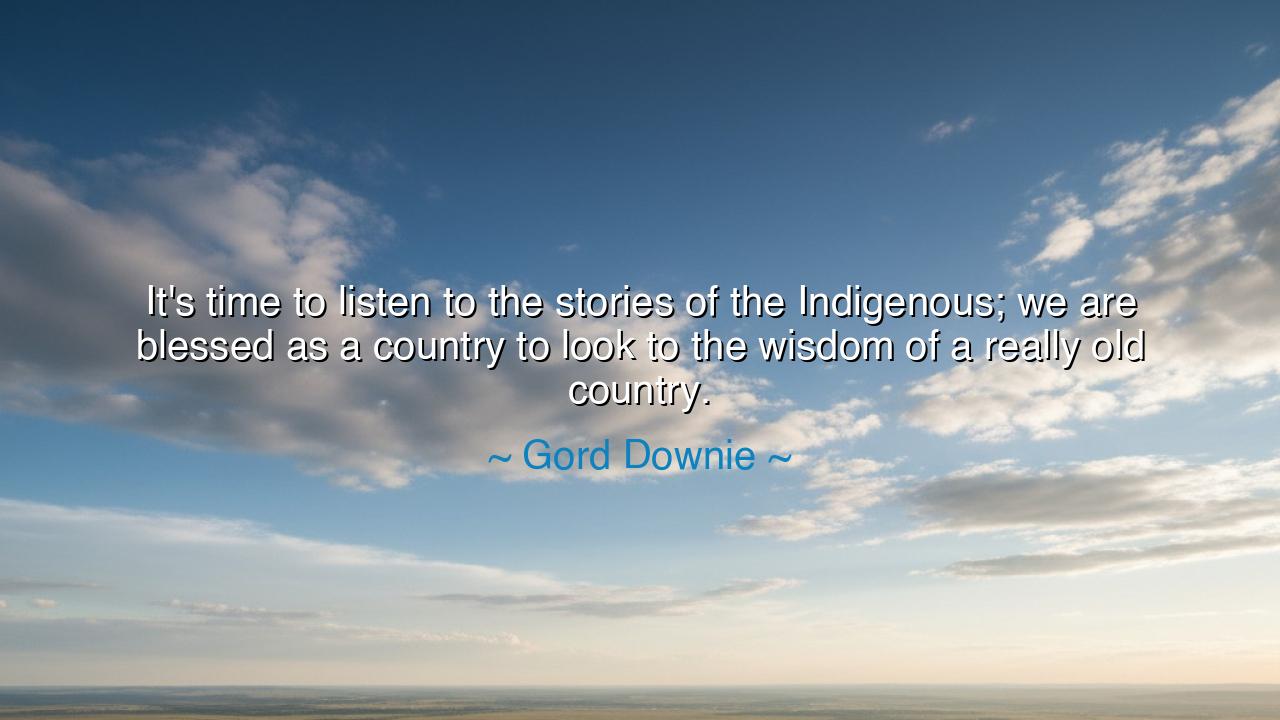
It's time to listen to the stories of the Indigenous; we are
It's time to listen to the stories of the Indigenous; we are blessed as a country to look to the wisdom of a really old country.






Gord Downie, poet of the North and voice of a nation’s conscience, spoke with reverence when he said: “It’s time to listen to the stories of the Indigenous; we are blessed as a country to look to the wisdom of a really old country.” His words call us back to the roots beneath our feet, to the voices that carried song and memory long before the flags of empire were planted in the soil. To listen is more than courtesy—it is an act of justice, of humility, and of renewal. For in the stories of the Indigenous lies a wisdom deeper than centuries, shaped by earth, sky, and spirit.
The wisdom of a really old country is not measured in governments or monuments, but in rivers that have run since time’s dawn, in forests that have watched generations rise and fall, in songs passed from elder to child by the fire’s glow. This wisdom teaches patience, balance, and respect for the land, lessons often forgotten in the haste of modern progress. Downie’s call is a reminder that the future of a people is secured not by silencing old voices, but by honoring them, learning from them, and weaving them into the fabric of tomorrow.
History itself offers testimony. When early settlers of the Americas faced winters of hunger and despair, it was the Indigenous peoples who taught them to plant maize, to fish the rivers, to endure the harsh seasons. Survival itself was a gift of their wisdom. Yet centuries later, these same people were silenced, displaced, and forgotten. Downie’s words rise as a healing fire, urging us to return to the fountain of knowledge that sustained life on this land long before modern nations drew borders upon it.
To listen is also to be changed. The stories of the Indigenous do not simply entertain; they awaken the heart, reminding us that humanity is not above creation but within it. In their tales of animals who speak, rivers who guide, ancestors who walk beside us, we find not fable but truth: that the world is alive, that all things are bound together, and that to forget this bond is to lose ourselves. Such wisdom is not old in the sense of withered, but old as in eternal, enduring, ever-renewing.
O heirs of this land, take heed of Downie’s call. Do not walk deaf through a country that has sung for thousands of years. Bow your head, open your ears, and let the stories of the Indigenous flow into you like rivers into the sea. For in their wisdom lies the medicine to heal division, the strength to endure the storms of time, and the vision to guide a nation into harmony with the ancient land it inhabits. To listen is to be blessed; to learn is to be renewed.






DCduy07 Chuanh
Downie’s words make me think about intergenerational learning and respect for experience. I feel curious about the specific stories and wisdom that Indigenous communities hold and how they might address contemporary challenges. Is society ready to listen openly without filtering these stories through preconceived notions? How can we ensure that valuing Indigenous knowledge leads to concrete social and cultural change, rather than simply being celebrated in rhetoric or art?
NTAn Nguyen Ngoc Thien
I find this statement both inspiring and challenging. It prompts me to consider how often Indigenous voices are marginalized despite their deep historical and environmental knowledge. I wonder how we, as a country, can move beyond symbolic recognition to genuine inclusion of Indigenous perspectives in governance, education, and social policy. Could engaging with this wisdom also reshape our relationship with land, community, and long-term sustainability?
TMThu Minh
This quote makes me reflect on the idea of cultural humility. I feel that Downie is encouraging a shift from dominant narratives to those that have existed for millennia. How can a society truly benefit from the wisdom of an ‘old country’ without appropriating or misrepresenting it? I’m curious about ways to integrate Indigenous teachings in a respectful, reciprocal manner, ensuring that listening transforms into meaningful action rather than token acknowledgment.
DADo Ai
Reading this, I feel a deep sense of respect and curiosity. Downie emphasizes the importance of listening to Indigenous stories, suggesting that their wisdom is essential for understanding our shared history and future. I wonder how much effort is currently being made to preserve and honor these narratives in schools, media, and policy. What practical steps can individuals and institutions take to genuinely engage with Indigenous knowledge and perspectives?